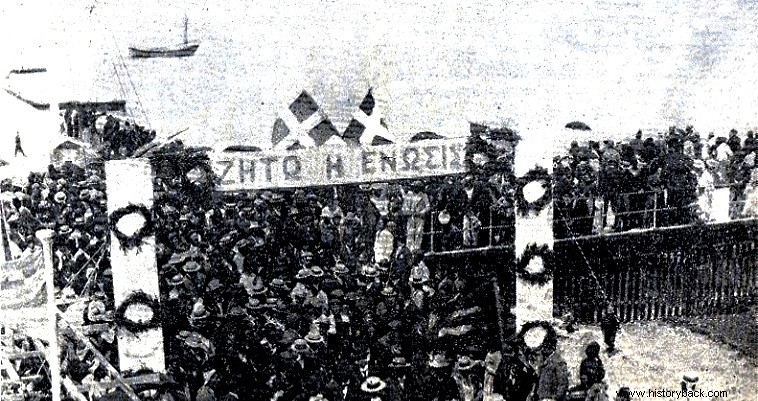
Cyprus, in its centuries-long historical course, has known many foreign dynasties. In 1878 the Turks ceded it to the British. The Cypriots initially welcomed this change, considering that the British would allow, at least in time, their union with Greece, as they had done with the Ionian Islands. Throughout the British occupation, the Greek Cypriots never stopped seeking union with the Motherland.
In 1889 a Cypriot delegation went to London and demanded Union with Greece. In 1895 rallies were held all over the island demanding the Union. New rallies took place on the island in 1902 and 1907 , always with the same request.
However, the British not only did not respect the feelings of the Cypriots, but in 1914, they officially annexed Cyprus, as a possession of the Crown. In 1915, Britain raised the issue of ceding Cyprus to Greece on the condition that the country exit the war in favor of ANTATE. The then Greek government did not accept the proposal.
In 1921 , on the occasion of the 100th anniversary of the revolution of 1821, rallies and demonstrations broke out all over Cyprus, always with the same demand, the union with the Motherland. In 1928 new rallies rocked the island, on the occasion of the 50th anniversary of the British occupation of Cyprus.
A year later a Cypriot delegation, led by Metropolitan Nikodimos of Kiti , went to London again, demanding the union of Cyprus with Greece. At the same time, the Cypriots also turned to the Greek government, looking for support, but met with closed doors , from the then government of El. Venizelou.
The Rebellion
Frustrated with the British and the Greek government, the Cypriots decided to take matters into their own hands. On the occasion of the decision of the British governor Roland Storrs to impose heavy taxation, the Metropolitan of Kiti called, on October 18, the Cypriots to fight for the Union with Greece, disobeying the British overlords.
On October 21 the rebellion broke out. At least 5,000 Greek Cypriots, mainly young people, students, students, led by priests, gathered in Nicosia shouting slogans in favor of the Union. The gathered besieged the governor's office and after throwing stones they stormed, occupied it and set it on fire.
At the same time, uprisings took place throughout the rest of Cyprus. The British flags were lowered by the rebels and the Greek flags were raised. In Nicosia the British used live fire, killing seven Greeks, including a 15-year-old child.
The British authorities, by force, managed to regain control in early November, simultaneously accusing the Greek consul general in Cyprus Alexios Kyrou of inciting the riots. In total, in addition to the dead, another 30 Greeks were injured, 10 were exiled from the island for life - among them Kitiou Nikodimos - while another 2,606 Greek Cypriots were sentenced to various sentences. Also, Athens, succumbing to British pressure, withdrew Kyros from the island. The then prime minister of Greece, Eleftherios Venizelos, did not support the Cypriot rebellion.
The result of the failed rebellion was to harden the British attitude on the island and to intensify the oppression. The British also forbade the mention of the word "Union" and the raising of the Greek flag. Storrs was also removed and succeeded by the tougher Richmond Palmer ushering in the 'Palmerocracy' period which lasted until the outbreak of the Second World War, when Britain needed the Greeks again.
